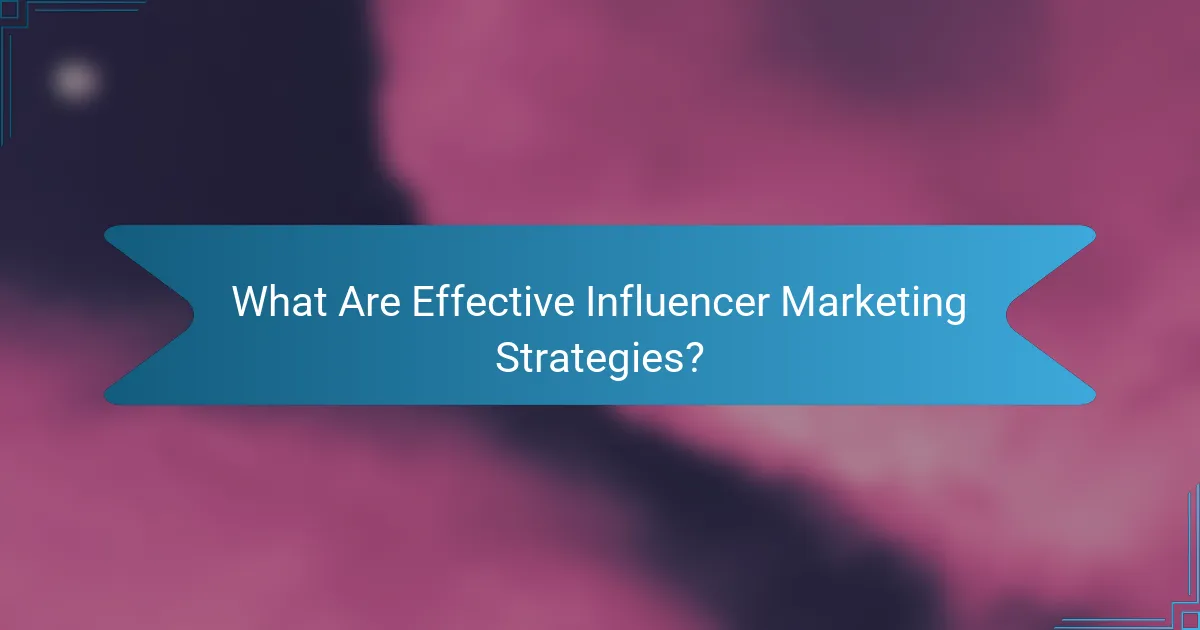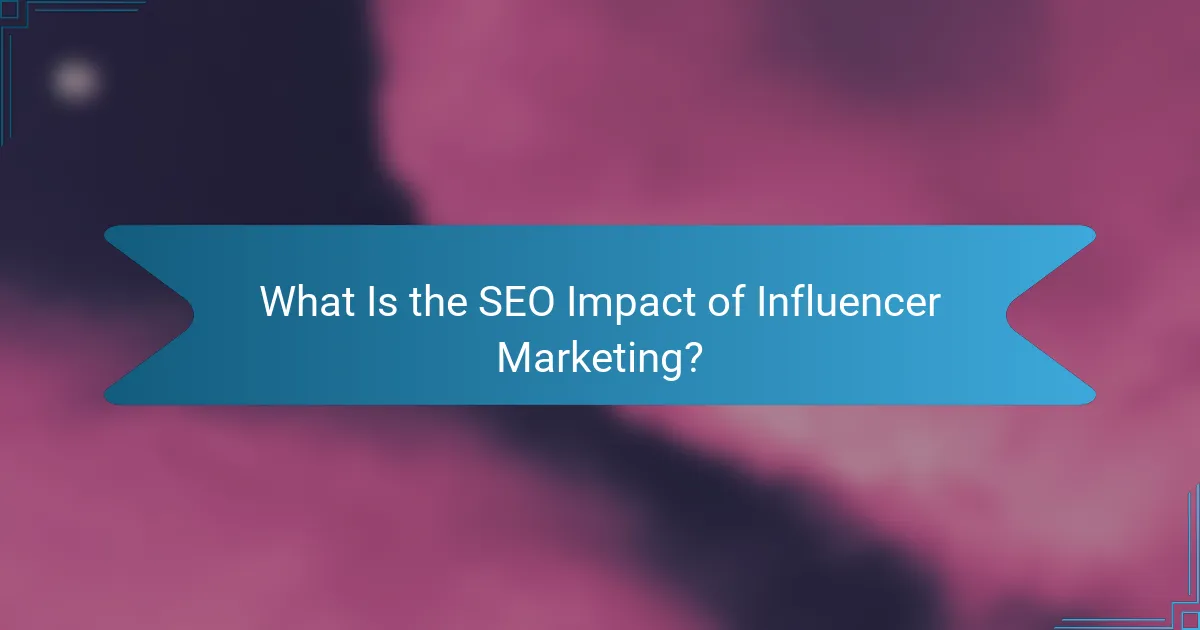Influencer marketing has emerged as a powerful strategy for brands aiming to enhance visibility and engagement through authentic connections with their target audience. By harnessing the credibility of influential figures, brands can not only foster trust but also drive sales and improve their SEO through increased organic traffic and valuable backlinks. Implementing effective influencer strategies can lead to significant benefits in both brand awareness and online presence.

What Are Effective Influencer Marketing Strategies?
Effective influencer marketing strategies leverage the unique strengths of influencers to enhance brand visibility and engagement. By selecting the right approach, brands can maximize their reach and foster genuine connections with their target audience.
Micro-Influencer Collaborations
Micro-influencers typically have smaller, but highly engaged audiences. Collaborating with these influencers can be cost-effective, often yielding higher engagement rates compared to larger influencers. Brands should consider partnering with micro-influencers whose values align with their own to create authentic content.
When selecting micro-influencers, look for those with follower counts in the range of 1,000 to 100,000. This allows for a more targeted approach, often resulting in better conversion rates.
Content Co-Creation
Content co-creation involves collaborating with influencers to produce content that resonates with both the brand’s and the influencer’s audience. This strategy can enhance authenticity and relatability, as the influencer’s unique voice is integrated into the brand’s messaging.
Brands should provide guidelines while allowing influencers creative freedom. This balance can lead to innovative content that feels genuine, such as videos, blog posts, or social media campaigns that reflect the influencer’s style.
Affiliate Programs
Affiliate programs incentivize influencers to promote products by offering them a commission for sales generated through their unique links. This performance-based approach aligns the interests of both the brand and the influencer, encouraging genuine promotion.
When setting up an affiliate program, consider offering competitive commission rates, typically ranging from 5% to 20%, depending on the product category. Clear tracking and reporting tools are essential for transparency and effectiveness.
Brand Ambassadorships
Brand ambassadorships involve long-term partnerships with influencers who consistently represent a brand. This strategy fosters deeper connections and loyalty, as ambassadors become synonymous with the brand over time.
To establish a successful ambassadorship, brands should choose influencers who genuinely love their products. This authenticity can lead to more impactful storytelling and a stronger emotional connection with the audience.
Social Media Takeovers
Social media takeovers allow influencers to temporarily manage a brand’s social media account, providing their unique perspective and engaging directly with the brand’s audience. This strategy can generate excitement and fresh content for followers.
When planning a takeover, set clear objectives and guidelines for the influencer. Promote the event in advance to maximize engagement and consider using interactive elements like Q&A sessions or polls to enhance audience participation.

How Does Influencer Marketing Benefit Brands?
Influencer marketing benefits brands by leveraging the credibility and reach of individuals with significant social media followings. This strategy can enhance visibility, foster trust, and ultimately drive sales.
Increased Brand Awareness
Influencer marketing significantly boosts brand awareness by placing products in front of a larger audience. When influencers share content featuring a brand, their followers are exposed to the brand’s message, often leading to increased recognition.
To maximize brand awareness, brands should choose influencers whose audience aligns with their target market. Collaborations can take various forms, such as sponsored posts, product reviews, or unboxing videos, all of which can effectively showcase the brand to new potential customers.
Enhanced Audience Engagement
Engagement is a key benefit of influencer marketing, as influencers often have a loyal and interactive following. Their authentic connection with their audience can lead to higher levels of interaction, such as likes, comments, and shares.
Brands should encourage influencers to create engaging content that resonates with their audience. This can include interactive polls, Q&A sessions, or live streams, which can foster a sense of community and encourage followers to engage with the brand directly.
Improved Conversion Rates
Influencer marketing can lead to improved conversion rates by driving traffic to a brand’s website or online store. Followers who trust an influencer are more likely to make a purchase based on their recommendations.
To enhance conversion rates, brands should track the performance of influencer campaigns through unique discount codes or affiliate links. This allows for better analysis of which influencers drive the most sales, enabling brands to refine their strategies for future collaborations.

What Is the SEO Impact of Influencer Marketing?
Influencer marketing can significantly enhance your SEO by driving organic traffic, improving domain authority, and creating valuable backlinks. These elements work together to boost your website’s visibility and ranking on search engines.
Boosted Organic Traffic
Influencer marketing can lead to increased organic traffic by exposing your brand to a broader audience. When influencers share content that links back to your site, their followers are more likely to visit your page, resulting in higher visitor numbers.
To maximize this effect, collaborate with influencers whose audience aligns with your target market. This ensures that the traffic generated is relevant and has a higher chance of converting into customers.
Improved Domain Authority
Working with influencers can enhance your website’s domain authority, a key metric used by search engines to determine your site’s credibility. When reputable influencers link to your content, it signals to search engines that your site is trustworthy and valuable.
To improve domain authority, focus on building long-term relationships with influencers who have a strong reputation in your industry. Regular collaborations can lead to consistent backlinks and increased authority over time.
Enhanced Backlink Profiles
Influencer marketing often results in high-quality backlinks, which are crucial for SEO. Backlinks from authoritative sites improve your site’s ranking and visibility on search engines.
To effectively enhance your backlink profile, create shareable content that influencers will want to link to. This could include informative blog posts, engaging videos, or unique infographics that provide value to their audience.

What Are the Key Metrics for Measuring Success?
Key metrics for measuring success in influencer marketing include engagement rate, return on investment (ROI), and conversion tracking. These metrics provide insights into how well an influencer campaign performs and its overall impact on business objectives.
Engagement Rate
Engagement rate is a critical metric that indicates how actively an audience interacts with an influencer’s content. It is typically calculated by dividing the total engagement (likes, comments, shares) by the total number of followers, then multiplying by 100 to get a percentage. A higher engagement rate often signifies a more invested audience.
For example, an engagement rate of 2-5% is generally considered good, while rates above 5% are excellent. Brands should aim for influencers whose engagement rates align with their target audience to maximize impact.
Return on Investment (ROI)
Return on investment (ROI) measures the profitability of an influencer marketing campaign relative to its costs. To calculate ROI, subtract the total campaign costs from the revenue generated, then divide by the campaign costs and multiply by 100. This provides a percentage that reflects the financial return.
A positive ROI indicates a successful campaign, while a negative ROI suggests a need for reevaluation. Brands should consider both direct sales and brand awareness when assessing ROI, as influencer campaigns can yield long-term benefits beyond immediate revenue.
Conversion Tracking
Conversion tracking involves monitoring specific actions taken by users after interacting with influencer content, such as making a purchase or signing up for a newsletter. This metric helps brands understand the effectiveness of their campaigns in driving desired outcomes.
To implement conversion tracking, brands can use unique discount codes or trackable links provided to influencers. This allows for precise measurement of how many conversions result from each influencer’s efforts. Regular analysis of conversion data can help refine strategies and improve future campaigns.

What Are the Prerequisites for a Successful Campaign?
Successful influencer marketing campaigns require a clear understanding of your goals, target audience, and the influencers who align with your brand. Establishing these prerequisites helps ensure that your efforts yield measurable results and resonate with your intended audience.
Clear Campaign Objectives
Defining clear campaign objectives is crucial for guiding your influencer marketing strategy. Objectives can range from increasing brand awareness and driving website traffic to boosting sales or enhancing customer engagement.
Consider using the SMART criteria—Specific, Measurable, Achievable, Relevant, Time-bound—to formulate your objectives. For instance, instead of aiming to “increase sales,” specify “increase sales by 20% over the next three months through influencer partnerships.”
Common pitfalls include setting vague goals or failing to align objectives with overall business strategies. Regularly review and adjust your objectives based on campaign performance to stay on track.
